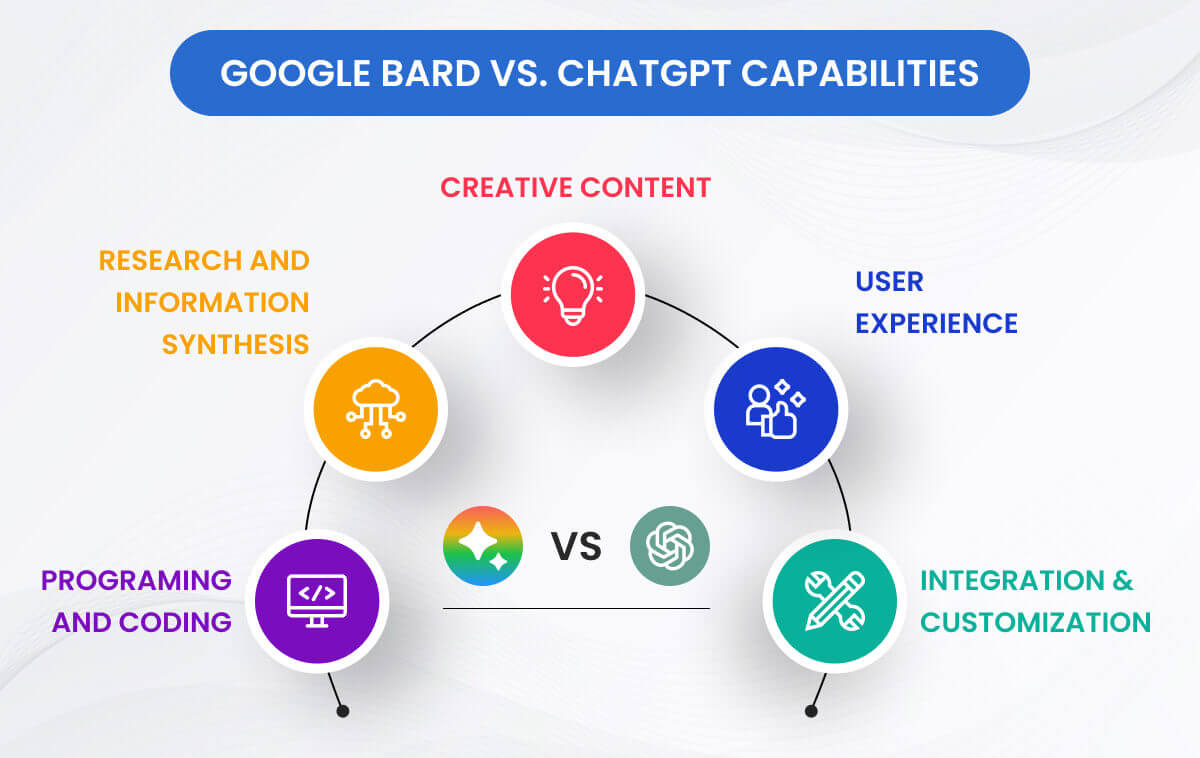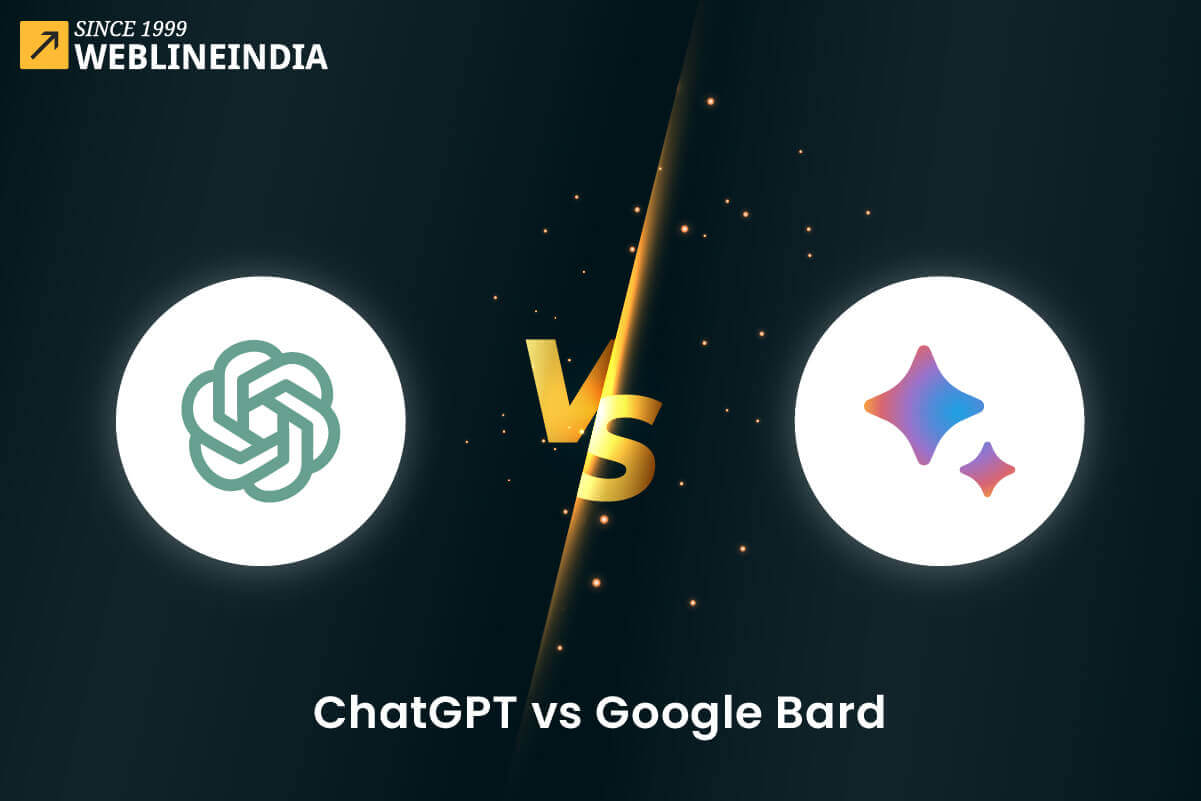Listen to the podcast :
Artificial intelligence (AI) has seen tremendous advancements in recent years. It is no exaggeration to say that AI Chatbots are the future of customer service and support. Today, we have two chatbot giants that serve millions of Internet users worldwide: ChatGPT and Google Bard.
ChatGPT and Google Bard are conversational AI chatbots with impressive natural language abilities are two of the most talked-about AI innovations. Both have captured the public’s imagination with their ability to understand questions and provide detailed, human-like responses.
But how exactly do these two chatbots compare? Which one currently performs better for different use cases? This comparative guide takes an in-depth look at the key similarities, differences, strengths, and limitations of ChatGPT vs Google Bard.
What is ChatGPT?
Developed by research company OpenAI and released in November 2022, ChatGPT is an AI system trained on a massive online text and conversation dataset. It uses a large language model (LLM) architecture called Generative Pre-Trained Transformer 3.5 (GPT-3.5), an advanced version of GPT-33.
ChatGPT can engage in free-flowing dialog on virtually any topic. It can answer follow-up questions, admit mistakes, challenge incorrect premises, and reject inappropriate requests. Impressively human-like exchanges make ChatGPT seem like an intelligent virtual assistant. The interface and capabilities also allow developers to build customized AI chatbot solutions.
The paid ChatGPT Plus subscription uses GPT-4, an even more powerful LLM. ChatGPT also offers developer APIs and support for third-party plugins.
What is Google Bard?
Bard is Google’s conversational AI chatbot, announced in February 2023. Google’s LLM system powers Pathways Language Model 2 (PaLM-2).
While initially lagging behind ChatGPT, Google has rapidly iterated on Bard, integrating it with Google Search and other products like Maps and Lens. Bard aims to be an AI assistant that can synthesize information across Google services.
Bard is still in limited preview, with plans to make it more widely available. It remains experimental as Google continues training and refining the underlying AI models.
Key similarities and differences
ChatGPT and Bard share the same basic premise – leveraging LLMs for conversational AI. But there are some notable differences:
- Creators: ChatGPT by OpenAI/Microsoft, Bard by Google
- LLM Foundation: ChatGPT uses GPT models, Bard uses PaLM
- Knowledge Base: ChatGPT trained until 2021; Bard accesses the current Google index
- Access to Internet: Only ChatGPT Plus has live Internet access
- Multimodality: Both support text and images, but only Bard currently outputs images
- Integrations: ChatGPT plugins are under development; Bard deeply integrated with Google services
- Pricing: ChatGPT is a free tier with a paid Plus version; Bard is currently free
In a nutshell, Bard focuses on search-based knowledge and leveraging Google’s ecosystem, while ChatGPT aims for wider conversational versatility.
If you are looking to hire chatbot developers, look no further! Skilled and experienced chatbot developers are available to meet your needs. With their expertise, you can rest assured that your chatbot project will be in capable hands. Don’t miss out on the opportunity to enhance your business with a custom-built chatbot.
Analysis of ChatGPT vs Google Bard capabilities
Let’s analyze how ChatGPT and Bard compare across different use cases:

Programming and coding
For technical applications like coding and data science, ChatGPT currently appears significantly stronger. ChatGPT can generate high-quality code in multiple languages in independent tests, debug errors, complete half-written programs, describe complex algorithms, and more. Its Codex capabilities make it versatile for programming tasks.
Bard struggles with precise logic and error-free code generation. This is a limitation of its underlying PaLM model architecture compared to GPT variants. However, Bard could improve as Google trains it further.
Research and information synthesis
Both ChatGPT and Google Bard offer intriguing potential as research assistants. They can rapidly synthesize information from various sources into well-organized overviews on many topics.
However, neither produces content reliable enough for academic publishing yet. The lack of cited sources and the tendency for factual errors are issues. Bard’s access to current Google data indexes gives it an edge for up-to-date information retrieval.
Creative writing and essays
The output quality is comparable for this stage of creative writing tasks like essays, stories, and articles. Both tools can write grammatically coherent long-form content with a human-like writing style.
Bard may have a slight edge for search-based content with the ability to incorporate recent online information. For highly original content like fiction, ChatGPT seems better equipped currently.
User experience
The user experience is quite similar – both provide a clean chat interface where users can get conversational responses by prompting queries. Bard has slightly more visual flair with its aesthetic and embedding of relevant images and links.
ChatGPT retains context across conversations better. But Bard enables users to return to previous questions and edit them, which can be helpful.
Integrations and customization
This category favors Google Bard currently, as it is more seamlessly integrated into Google’s vast ecosystem spanning search, email, cloud, maps, and more. Early integrations like compiling information from Gmail demonstrate Bard’s potential.
More integrations are rapidly emerging, too. ChatGPT’s third-party integration ecosystem is still nascent compared, though its developer platform facilitates building custom ChatGPT solutions.
Discover the key differences between Google Gemini, Copilot, and ChatGPT. Compare features, performance, and AI capabilities.
Strengths and limitations
Google Bard strengths
- Integration with Google services
- Access to updated online information
- Clean, visually appealing interface
- Image and link embedding in answers
- Editable previous questions
Google Bard weaknesses
- Lower accuracy for complex logic/programming
- Factual inaccuracies and errors
- Limited custom integrations so far
- Still in the experimental phase
ChatGPT strengths
- Excellent capabilities for coding and technical tasks
- More conversational versatility
- Developer platform enables third-party integrations
- Established free offering with paid Plus upgrade
ChatGPT weaknesses
- Knowledge cutoff in 2021 for the free version
- Can generate incorrect or nonsensical responses
- Limited integrations with other services so far
- Length limits on some response types
Which is better for you? Key considerations
With both Google Bard and ChatGPT rapidly evolving, which one is best depends on your priorities:
- For programming and technical use cases, ChatGPT is currently more advanced. Bard may catch up as Google refines its AI.
- If you want integration with other Google services, Bard is the obvious choice. ChatGPT may eventually have more third-party integrations.
- Consider ChatGPT’s free offering vs Bard’s lack of length limits if those factors matter. However, Bard provides images and links.
- Weigh recent knowledge from the internet vs cutting-edge conversational versatility. Both have advantages.
- Keep in mind that these are still early-stage technologies with much progress ahead. Evaluate judiciously for reliability and accuracy.
The road ahead
Google Bard vs ChatGPT represents a new paradigm in AI but still requires much improvement before realizing its full potential. We expect rapid iterations with these tools in the near future.
OpenAI plans more advanced LLMs like GPT-5 in 2023. Google will continue enhancing Bard’s capabilities and seamless integrations. Over time, the technology could become robust enough for trusted real-world use across education, healthcare, and more sectors. User feedback will be key in shaping how these conversational AIs evolve. The possibilities are exciting but require developing the technology responsibly with human values in mind.
ChatGPT and Bard provide a fascinating glimpse of the future. As consumers and developers engage with these tools, we will keep learning more about their strengths, weaknesses, and the impact advanced AI can have on our lives. Partnering with AI and chatbot development experts is recommended for those building similar capabilities.
Ready to build an AI-enabled chatbot?
It does not matter who wins in the battle of Google Bard Vs. ChatGPT, AI-enabled chatbots will rule all industries as they provide quick responses to any query raised by users and customers. If you want to enhance your business profits by streamlining customer services, chatbot app development is the answer. Contact us now and take your customer care services to newer heights assuring loyalty and growth.
Testimonials: Hear It Straight From Our Customers
Our development processes delivers dynamic solutions to tackle business challenges, optimize costs, and drive digital transformation. Expert-backed solutions enhance client retention and online presence, with proven success stories highlighting real-world problem-solving through innovative applications. Our esteemed clients just experienced it.










